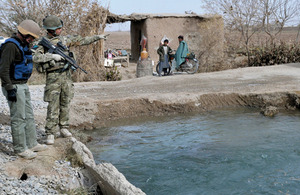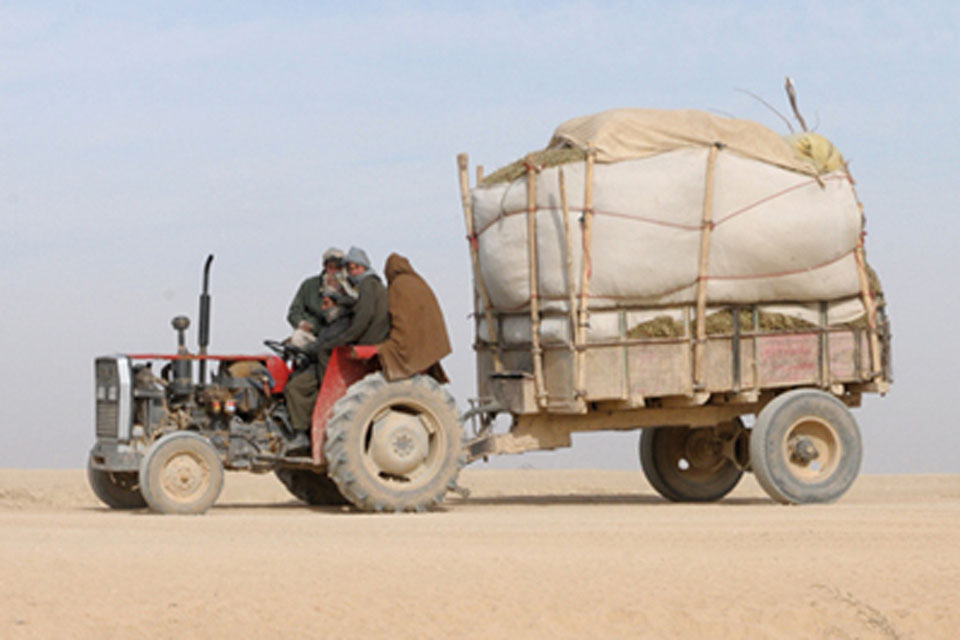Helping Afghans build their future
Having cleared the Taliban out of Helmand's 'Red Wedge', British soldiers are now working with military and civilian stabilisation experts to help the locals build their future. Report by Ian Carr.

Adrian Dubois considers a culvert that needs rebuilding [Picture: Sergeant Martin Downs RAF, Crown Copyright/MOD 2010]
Without breaking step, Major Bayard Barron, officer in charge of B Company, 1st Battalion The Royal Irish Regiment, introduces himself as we march towards the Mastiffs:
This is Afghanistan’s Helmand province, the most dangerous place - in the world.
Then, he added:
Major Barron has no idea what he is in for today, but then, he has no idea what he is in for any day! Is that the sort of tabloid crap you are here to write?
I assure him it’s not. I tell him that I’m here to look at provincial reconstruction. That seems to satisfy him, and earns me a ride in his Mastiff to go and see. Mind you, if I had been intent on writing a testosterone-filled piece about alpha males blasting their way through the badlands, I’ve found my man.
Based at Forward Operating Base Shawqat in Nad ‘Ali (South), in just three months the Royal Irish shredded the insurgents that had been controlling much of the area around the base, earning it the reputation of being a no-go area and the sobriquet the ‘Red Wedge’.
In the first two-and-a-half months of their tour there were 546 serious incidents, 93 per cent of which involved direct fire. It’s not like that now:
We haven’t had a small arms incident in the centre of our operational area for weeks,” says Major Barron.
We have created a secure space, now it’s time for the locals to step in and decide what they want to do with it.
The Major’s view is simple:
The days of ISAF throwing money around are over, and we need to make that clear. If someone says to me their irrigation ditch is blocked, I ask what would they do if we weren’t here?
Although trenchantly stated, the message the Major is keen to get across is this - it is time that the Afghan population understands that development is in their hands and must be done through their own government structures, with ISAF in a supporting role:
We have to persuade people to embrace GIRoA [Government of the Islamic Republic of Afghanistan],” said Adrian Dubois, a lean ex-Para, now head of the District Stabilisation Team for the area.
Adrian is a stabilisation adviser deployed by the Stabilisation Unit which is jointly owned by the MOD, the Foreign and Commonwealth Office and the Department for International Development. His job is to liaise with the battle group, the district governor and the locals to put stabilisation plans into practice:
I could easily dip into my big wad of cash and build a school for anyone who asks for it, but that’s not the solution.” he said.
I’m constantly having to manage local expectation by putting the handbrake on to ensure that the Afghan Government is seen as the right route to get things done.

Farmers in Nad 'Ali [Picture: Sergeant Martin Downs RAF, Crown Copyright/MOD 2010]
Building something solves nothing if the infrastructure isn’t there to support it:
If we opened a school tomorrow, would it be registered in the District Community Council plan, would there be teachers, is it feasible, are there enough children registered to make it viable?
The local government has drawn up sector plans based on seven main themes which include things such as security, agriculture and health. Having provided the security, Major Barron now feeds in ideas and information to the locals, and to Adrian to take forward the rest:
I look at those suggestions in the context of GIRoA plans,” explained Adrian, “see if they are supported and consider the local legitimacy of what is being proposed.
His approach needs to be balanced. If there is something he can do that will address an area of real and urgent need he will fund it, and if needs be advise the government to rebalance their plans.
To help him make informed decisions, Adrian is supported by Captain Jaco Van Der Merwe, a Royal Engineer and the Military Stabilisation Support Team representative:
I am Adrian’s eyes and ears on the ground,” he said. “I gather infrastructure information, for example I know where the electricity supplies in the area are and what they can generate.
Today he and Adrian are getting out to look at development projects that Major Barron needs to discuss. As we wait for the vehicles, the Major and Adrian explain how things are these days in their backyard.
Adrian and the Major are the yin and yang of the development process, working closely to make things better. Clearly they have tremendous respect for each other, understand the other’s point of view and broadly agree about what needs to be done.
The main issue is pace of change:
At the pre-deployment stage we need to prepare incoming battle groups that this is a fast-meets-slow situation,” said Adrian. “For 12 months troops train hard to come here for six-month tours. They arrive adrenaline-fuelled. They are highly capable and keen to get on with it.
Their job is to create the security bubble as quickly as possible, and they want to see progress quickly, especially when they have worked as hard and fought as superbly as the Irish have done.
Bayard did what was considered impossible clearing out the Red Wedge. But the Afghans don’t fit our timescales, they are not just here on a six-month tour. Having sorted out security, we need to stop from time to time and let GIRoA catch up.
In recently cleared areas, local co-operation can last only until the next round of intimidation occurs, but here the Royal Irish have maintained the security bubble, giving the locals, for the first time in years, a chance to discuss what they want for the future. Major Barron describes this as a positive challenge:
When we talk to the people the first thing they ask for is security, we’ve given them that, then it’s ‘we want a school’. All the kids want to be interpreters or doctors. The thing is, if they want a school they have to understand that they have to lobby their District Community Council, get it in the plan, get it properly resourced through the Department of Education.
Both men feel the message is filtering through, but they sympathise, up to a point, with those who feel the need to get whatever they can from their benefactors.
Maybe, in the early days, in an effort to win hearts and minds, ISAF largesse may have created a culture of ask and it will be given. And in an area that has known 30 years of war, the wise man soon learns to get what he can while it’s on offer because tomorrow the well may run dry, or you might be dead. So impressing people that GIRoA is how to get things done requires understanding and patience.
Long-term success depends on the careful nurturing of relationships and the development of trust with the locals.
For Adrian, that includes tempering the battle group’s natural urge to crack on while ensuring that sustainable progress is made. Then, having ‘tamed’ the Irish, although he would never put it that way, he will have to do the same again when they end their tour in April and another group of alpha males, the Royal Marines, arrive determined to make their mark.

Farmers in Nad 'Ali [Picture: Sergeant Martin Downs RAF, Crown Copyright/MOD 2010]
Building up knowledge and an understanding of the area, who holds power, who can be trusted, is also crucial. Partly for this reason Adrian has signed up for a twelve-month tour instead of the usual six:
Bayard knows his operational area better than anyone else. He is absolutely brilliant at building relationships with both the good and the bad boys around here, and you have to be pragmatic,” said Adrian.
Some of them do have political aspirations and want to work with us to build government infrastructure. But Bayard will be going home in a couple of months, so I have to keep that impetus going.